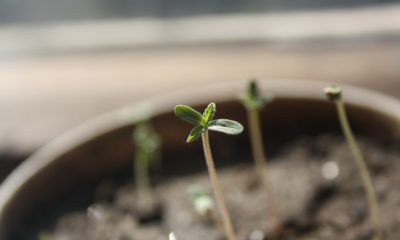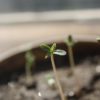
Cultivation
Tweedle Farms Goes Beyond CBD
Oregon-based producer Tweedle Farms goes beyond CBD to offer smokable hemp buds.
As the CBD frenzy sweeps the nation, consumers can find the cannabinoid in everything from soft drinks to deodorant. Hemp fields now cover huge swaths of American farmland, and professional sports players celebrate CBD on social media. It’s certainly exciting to watch as cannabis reaches the masses, but one can’t help but think there’s more to the plant than one three-letter acronym.
For a fresh take on the hemp industry, I visited Tweedle Farms outside Portland, Oregon to learn about the company’s success in offering quality smokable hemp and how it has educated a whole new breed of consumers on the importance of the lesser-known compounds found in cannabis.
My drive north that early November morning from Southern Oregon started on a sour note, as I passed countless acres of neglected and rotting low-THC cannabis plants waiting to be stripped down to isolate form and passed onto customers in that sad state, devoid of all full spectrum goodness in the name of pure CBD. I drove up the coastal range into northwestern Oregon, and found the farm down its namesake Tweedle Road, surrounded by Douglas fir and rolling pastures. Thankfully, after arriving at the headquarters of Tweedle Farms, co-founder James Green and COO Andrew Gruver lifted my spirits with their perspective on the upsides of hemp proliferation.

The Mother of All Cannabinoids
At Tweedle Farms, Green and Gruver focus on hemp flower, which not only includes the cannabinoid CBD but also includes other compounds — like terpenes and fatty acids — that can contribute to the healing properties of the plant.
Founded in 2016, the company began as a small-scale craft hemp producer but quickly morphed into an online, flower-pedaling powerhouse that ships connoisseur-grade hemp products across the nation. The business now boasts 20-plus full-time employees made up of family and friends between the farm in northwestern Oregon and the shipping and receiving office in Portland.
“The website started at the end of February 2018, and we got our first few orders within a few hours, we didn’t even know it was live yet,” says Gruver. “We had no clue what we were doing, we didn’t even have envelopes or packaging together.”
The demand quickly escalated beyond their namesake farm’s inventory, so the company began sourcing quality hemp flower from local farmers and friends. At the headquarters, buds are closely inspected, given a final manicure and tested by one of Oregon’s accredited laboratories for potency, pesticides and terpene content before sale.
“We include a notice to law enforcement, actual COAs [certificates of analysis], terpene analysis and every bit of information we can offer about each product we ship to the customers,” says Gruver. “We try to be as transparent as possible.”
Gruver and Green say they are most excited to share novel terpenes and minor cannabinoids with their customers. Last year, they grew a small amount of CBG-rich flower at their farm and have created a slew of products highlighting it. CBG has shown promise as a potential cancer fighter in preliminary studies. Research has shown it can also significantly lower the intraocular eye pressure caused by glaucoma.
“After the first pure CBG lines hit the market, it has ignited this fire for the minor cannabinoids,” Gruver says. “There is so much we don’t know already about them, it’s exciting to be moving in that direction.”
During a tour of the inventory, the pair shows me an array of beautiful hand-trimmed flowers that look and smell almost identical to their THC-laden cannabis counterparts.
“This spring, we even did a run in our greenhouses with supplemental lights that was essentially like an indoor run [of high-THC cannabis], the flowers turned out absolutely gorgeous,” says Green.
High-grade smokable hemp flower dominates the company’s sales, but Tweedle Farms also provides concentrates, topicals, tinctures and edibles.

Education and Exploration
Green and Gruver attribute much of their company’s success to the wealth of information on their products that they provide to those who generally don’t have access to it or are too shy to enter dispensaries and CBD shops. Two full-time employees answer every phone call, email, Facebook message and online review to pass on as much data as possible to browsers and buyers.
“We both come from the THC side of cannabis, so we try to replicate a dispensary experience for everyone who comes to our site,” Gruver says.
With a customer base that is often new to cannabis use, they’ve also worked to educate consumers and broaden their understanding of the compounds in cannabis as a whole.
“We do our best to keep certain strains in stock, but we like to alternate between interesting varieties,” Gruver says. “If someone calls looking for a strain we don’t have on our shelves, I find three or four varieties with similar cannabinoid and terpene profiles and suggest they try them out at a discount and tell me what they think.”
“Now we’ve got people all over the nation trying new strains and really exploring their options with cannabis,” Green explains. “It’s great to see people seek novel terpenes, or strains with an interesting story.”
While talking to the duo, I was also struck by their overall commitment to the environment. Their farm opts for biodegradable row covers in an era where thousands of acres across the nation are covered in standard plastic that’s bound for landfills and waterways. All their flower is shipped in compostable sealable bags, hemp plastic “doob” tubes and concentrate containers made from reclaimed ocean plastic.
“Sustainability is really at our core,” Gruver says. “From our farming techniques to our packaging, we try to do everything we can. If we have to pay more for a higher quality, more sustainable product, we will always do it.”
This story was originally published in the print edition of Cannabis Now.


























